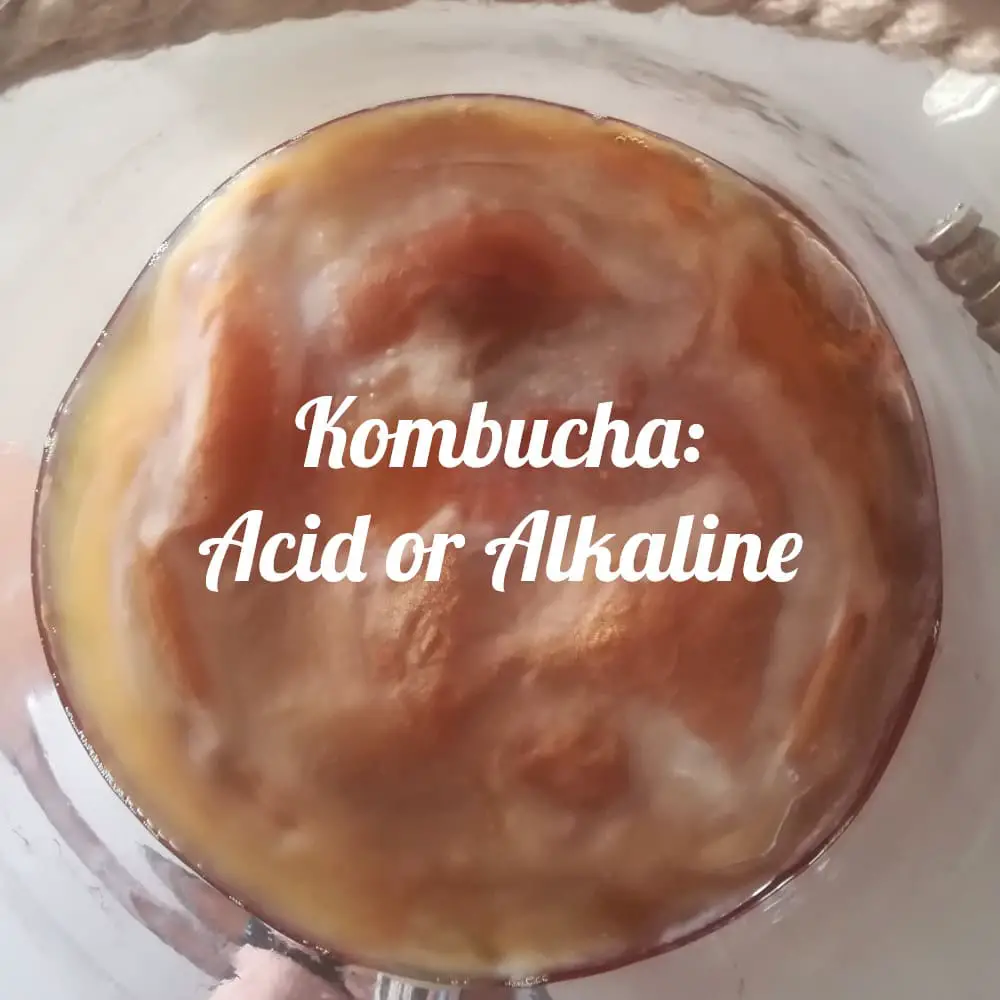
It’s impossible not to smell kombucha; it’s too strong not to, so indeed, you must think that kombucha is acidic and can be bad for your acidity, but is it? The answer will surprise you.
Alkaline or acidic? Kombucha is an acidic beverage with an average pH of 3 (2.5-3.5). However, notwithstanding the above, as long as it is consumed in reasonable doses, kombucha has an alkaline effect on the body due to a buffering property.
As you will see later, its acidity is due to the fermentation process that gradually raises organic acids decreasing the pH, which is one of the reasons for the antimicrobial property against pathogens attributed to kombucha.
Even so, the overproduction of acids must be avoided by controlling and maintaining hygiene conditions during fermentation.
Contents
So, is kombucha acidic?
Yes, this is due to the fermentation of tea that can increase the concentration of acetic acid, reaching a taste of slightly acidic to one totally acidic and sometimes even somewhat alcoholic or fruity, depending on the degree of fermentation, but also the amount of substrate. [1]
During fermentation, acetic acid bacteria mainly convert glucose and ethanol into gluconic and acetic acids. Still, it produces other organic acids such as lactic acid, malic glucuronic, and oxalic, although the latter depends on the initial composition of the SCOBY.
These acids create an environment where only they can exist, offering antimicrobial activity against pathogenic bacteria. Therefore, it is a protective effect against other invading contaminants. [2] [3]
You should keep in mind that the pH at this level can corrode certain materials, such as ceramics or metal, which can cause contamination due to leaking materials that can be harmful such as lead or aluminum. [1]
Just because kombucha is acidic doesn’t mean it will give you heartburn or anything like that, but we’ll develop this idea later.
How acidity changes in kombucha
As we mentioned earlier, acetic acid bacteria transform sugar and ethanol into gluconic acid and acetic acid, which are what provide the acidity of the product. [2]
Acetic acid can stimulate yeasts to produce more ethanol, which facilitates the growth of acetic acid bacteria, leading to increased production of this acid. [1]
Therefore, the longer kombucha is allowed to ferment, the higher its acidity. Although the type of substrate used during fermentation can generate different pH levels compared to the same days of fermentation, the tendency continuously decreases pH over time, becoming more acidic. [4]
Does kombucha acidify the body?
Kombucha tastes acidic, contains organic acids, and smells like vinegar acid. Indeed, you think that kombucha will leave you with very high acidity, but no, it is not like that.
The acidic or alkaline effect a food can have on the body does not depend on its pH but depends on the by-products created once they are digested, which is why lemon juice, despite being acidic, has an alkaline effect on the body.
In the case of kombucha, where we already know that it is an acidic food, thanks to its compounds derived from tea, it produces an alkaline effect in our body.
Apart from the components, the alkaline effect is deeply linked to the detoxifying properties of kombucha, where many of the enzymes and organic acids present are similar to those in our body, facilitating the work of the liver. [1]
We will explain a little more about this effect later.
Is it good for heartburn or gastric ulcers?
Kombucha tea can provide properties that benefit health related to the acid composition of the drink since several studies in rats or in vitro have shown the benefits it can offer on acidity.
Specifically, two exciting things have been demonstrated:
The first is that kombucha can inhibit the growth of Helicobacter pylori bacteria, one of the bacteria associated with ulcers. [1]
The second substantial effect is that in studies in rats, a healing property has been revealed for ulcers in our stomach. It is suggested that it is due to the antioxidant effect of kombucha, thanks to its polyphenols content, which we have already discussed previously.
Why does the alkaline effect occur?
There is a buffer effect for neutralizing luminal acid thanks to some of the organic acids contained in tea, including the lactic acid mentioned above. However, it has also been found that if some of the by-products of the tea fermentation process decrease, the pH value of the beverage can have a buffering capacity. [1] [3]
This is due to the dissociation of carbon dioxide producing a hydrocarbon anion that reacts with hydrogen ions generating a buffering effect. [1]
Even during fermentation, it has been found that when 10% of the inoculum of a previous fermentation batch was added (pH 6.2) and the pH of the medium immediately dropped to a pH of 4.0, or also if a starter with a pH of 3.0 was added, an increase also occurred at a pH of 4.0, these data suggest that the tea should have a powerful buffering capacity around pH 4.0 that buffers any sudden pH changes. [5]
In addition, the pH usually drops to pKa values (a measure of dissociation) similar to that of the two most common acids during fermentation which are lactic and acetic acid.
References
[1] Watawana, M.I. et al. (2015) Health, Wellness, and safety aspects of the consumption of Kombucha, Journal of Chemistry. Hindawi.
[2] Sreeramulu, G., Zhu, Y. and Knol, W. (2001), Characterization of Antimicrobial Activity in Kombucha Fermentation. Acta Biotechnol., 21: 49-56.
[3] Banerjee D, Hassarajani SA, Maity B, Narayan G, Bandyopadhyay SK, Chattopadhyay S. Comparative healing property of kombucha tea and black tea against indomethacin-induced gastric ulceration in mice: possible mechanism of action. Food Funct. 2010 Dec;1(3):284-93. doi: 10.1039/c0fo00025f. Epub 2010 Nov 3. PMID: 21776478.
[5] https://agris.fao.org/agris-search/search.do?recordID=SD2005000054
